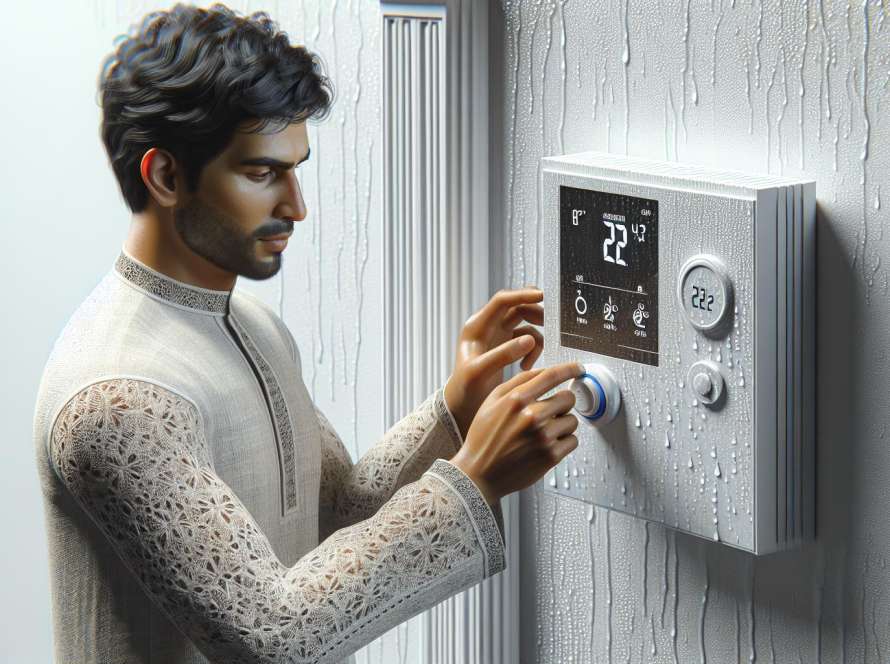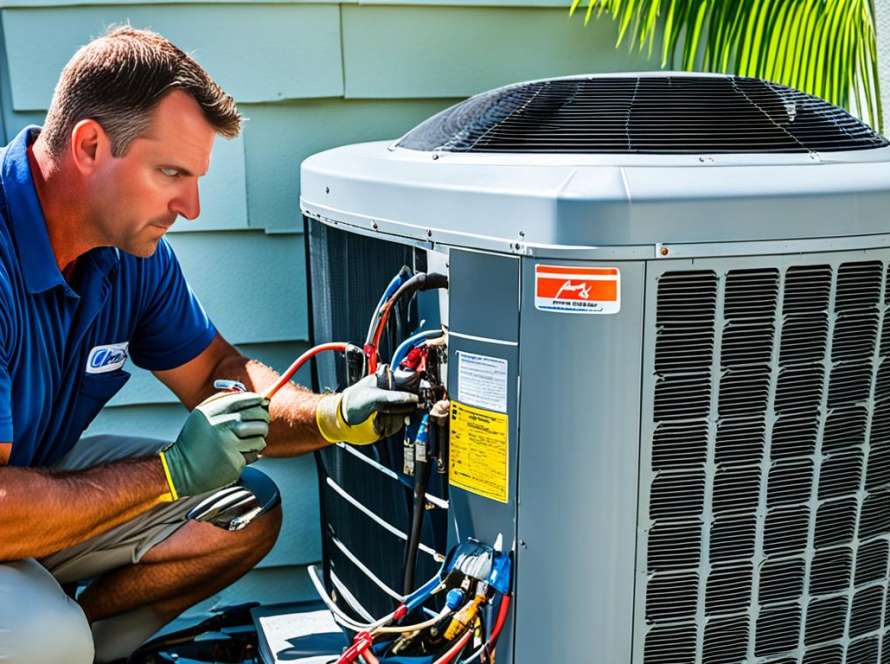So, you’re in Florida, where the sun shines bright and the heat can be relentless. We all know how crucial a well-functioning air conditioning system is for our comfort and well-being in this tropical climate. When the AC starts acting up, it can be a real headache, especially during those scorching summer months. But fret not, because we’ve got your back with our efficient AC repair guides tailored specifically for Florida homes.
Signs of AC Problems in Florida Homes
Living in Florida, where the heat can be relentless, having a properly functioning air conditioning system is crucial. Recognizing the signs of AC problems early on can help prevent major issues down the line. Here are some indicators to look out for:
For Beginners: Recognizing Common Warning Signs
- Warm Air: If your AC is blowing warm air, it could be a sign of a refrigerant leak or a compressor issue.
- Poor Airflow: Insufficient airflow could indicate a clogged filter or ductwork problem.
- Odd Smells or Noises: Foul odors or strange noises coming from your AC may point to mold growth or mechanical issues.
- Frequent Cycling: If your AC turns on and off frequently, it might be struggling to maintain the set temperature.
For Intermediate Homeowners: Digging Deeper into the Diagnosis
- High Humidity Levels: Excessive humidity in your home could be a result of an AC malfunction, leading to discomfort and potential mold growth.
- Uneven Cooling: If certain rooms are cooler than others, it could be a sign of imbalanced airflow or insulation problems.
- Water Leaks: Water pooling around your AC unit could stem from a clogged condensate line or a refrigerant leak.
- Frozen Evaporator Coil: A frozen coil indicates a potential issue with airflow or refrigerant levels.
- Electrical Problems: Constant tripping of the circuit breaker may signify underlying electrical issues with the AC unit.
- Age of the AC Unit: If your AC is over 10-15 years old, it might be more cost-effective to consider replacing it rather than frequent repairs.
Being proactive in addressing these warning signs can help prevent emergencies and costly repairs down the road. Regular maintenance and timely repairs are key to ensuring your AC keeps you cool and comfortable in the Florida heat.
Regular Maintenance Tips for AC Systems

For Beginners: Basic Maintenance Steps
- Change air filters regularly to ensure proper airflow.
- Clean the outdoor unit to prevent debris buildup.
- Check thermostat settings for optimal temperature control.
- Inspect visible ductwork for any signs of damage or blockages.
For Intermediate Homeowners: Detailed Maintenance Guidelines
- Schedule professional HVAC inspections at least once a year.
- Clean evaporator and condenser coils to improve efficiency.
- Monitor refrigerant levels for peak performance.
- Test airflow and inspect ducts for leaks or restrictions.
- Conduct regular energy efficiency assessments for cost savings.
- Invest in a programmable thermostat for customized temperature control.
- Consider duct sealing and insulation for enhanced cooling.
- Upgrade to a high-efficiency air filter for improved indoor air quality.
| AC Maintenance Frequency | Recommended Schedule |
|---|---|
| Change Air Filters | Every 1-3 Months |
| Professional Inspections | Annually |
| Coil Cleaning | Bi-Annually |
| Refrigerant Check | Bi-Annually |
Keep your AC system running smoothly with these maintenance tips tailored to your expertise level.
Finding the Right AC Repair Service in Florida
When it comes to getting your air conditioning system back up and running in Florida, finding the right AC repair service is crucial. It can be a daunting task, but with the right approach, you can ensure your AC unit is in good hands. Here are some tips based on different expertise levels:
For Beginners: Initiating the Search
- Research Local Companies: Start by researching local AC repair services in Florida.
- Check Reviews: Look for reviews and testimonials from previous customers to gauge their satisfaction.
- Verify Licensing and Insurance: Ensure the company is licensed and insured to perform AC repairs in Florida.
For Intermediate Homeowners: Navigating the Options
- Ask for Recommendations: Seek recommendations from friends, family, or neighbors who have had positive experiences.
- Inquire About Experience: Ask about the technicians’ experience and certifications in handling AC systems.
- Request Written Estimates: Get written estimates from multiple companies to compare pricing and services.
- Check Credentials: Verify industry certifications and memberships with associations like NATE or ACCA.
- Inquire About Warranty: Ask about warranties on repairs and the availability of 24/7 emergency services.
- Discuss Maintenance Plans: Consider companies that offer ongoing maintenance plans to keep your AC system running efficiently.
Selecting the right AC repair service in Florida is essential for maintaining a comfortable indoor environment, especially in the hot and humid climate of the Sunshine State. By following these guidelines, you can make an informed decision and keep your AC system in top shape.
DIY AC Troubleshooting Techniques
For Beginners: Quick and Easy Checks
- Check Thermostat Settings: Ensure it’s set to “cool” and the temperature is lower than the current room temperature.
- Inspect Air Filters: Dirty filters can restrict airflow, impacting cooling efficiency.
- Examine Circuit Breakers: Make sure the circuit breaker for your AC unit hasn’t tripped.
- Clean Around the Outdoor Unit: Keep it free from debris and vegetation to promote proper airflow.
For Intermediate Homeowners: Intermediate Methods
- Inspect Ductwork: Look for leaks or gaps that could be reducing efficiency.
- Check Condenser Unit: Clean the fins and remove any obstructions around the unit.
- Evaluate Refrigerant Levels: Low refrigerant can indicate a leak that needs professional attention.
- Test Capacitors: A multimeter can help check if these components are functioning correctly.
- Compressor Check: Test the compressor for proper functioning and watch out for any unusual noises.
- Inspect Fan Motors: Lubricate fan motors and ensure they are operating smoothly.
- Ductwork Sealing: Consider professional duct sealing to optimize airflow and efficiency.
- Electronic Control Board Evaluation: For complex issues, the control board might need inspection by a professional.
| Keyword | Search Volume |
|---|---|
| AC Troubleshooting techniques | 880 |
| HVAC troubleshooting tips | 720 |
| DIY air conditioner repair | 590 |
| AC not cooling | 480 |
| How to fix AC problems | 390 |
Precautions to Take Before Attempting AC Repairs

For Beginners: Basic Safety Measures
- Disconnect the Power: Before starting any AC repair, turn off the power to the system to avoid electrical accidents.
- Wear Protective Gear: Always wear gloves and safety goggles to protect yourself from sharp edges and debris.
- Consult Manuals: Refer to the manufacturer’s manuals for safety guidelines and proper procedures.
For Intermediate DIYers: Equipment Inspection
- Check for Leaks: Inspect the AC unit for any visible leaks or unusual sounds that may indicate a problem.
- Inspect Wiring: Look for any wear or damage in the wiring and connections before proceeding with repairs.
- Use Proper Tools: Ensure you have the correct tools for the job to prevent damaging components.
- Consider Environmental Factors: Evaluate surroundings for potential obstructions or issues that may impact AC performance.
- Assess System Age: Older systems may require more delicate handling and specialized attention.
- Seek Professional Advice: When in doubt, consult a professional HVAC technician to avoid causing further damage.
| Safety Precautions | Intermediate Inspection | Advanced Considerations |
|---|---|---|
| Turn off power | Check for leaks | Consider surroundings |
| Wear protective gear | Inspect wiring | Assess system age |
| Consult manuals | Use proper tools | Seek professional advice |
Conclusion
Ensuring safety and precision in AC repairs is paramount for all skill levels. By following the outlined precautions, we can tackle troubleshooting with confidence. From basic safety measures to assessing system age, each step plays a crucial role in maintaining efficient cooling systems in Florida homes. Remember, when in doubt, seeking professional guidance is always a wise choice. Let’s approach AC repairs with a proactive mindset, prioritizing safety and efficiency in every DIY endeavor.

